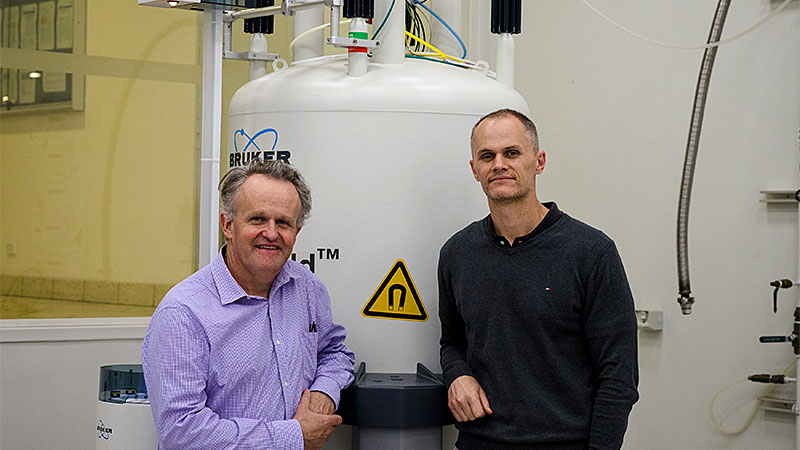October 26, 2021
Neuro Vigor and the University of Western Australia announce drug development collaboration agreement

Neuro Vigor plans to develop new drugs based on the discoveries of Phil Burcham (left) and Matt Piggott of the University of Western Australia to treat spinal cord injuries and neurological disease. Neuro Vigor and the university signed an agreement to collaborate in the full commercialization of these high-potential drug candidates. (Photo: Aaron Gort Photography)
Focus will be on new chemical entities to neutralize reactive aldehydes associated with multiple inflammatory diseases and trauma
HAMMOND, Ind. – Neuro Vigor, a Purdue University-affiliated biotechnology company developing drugs that neutralize reactive aldehydes, announced Tuesday (Oct. 26) a collaboration agreement with the University of Western Australia to jointly develop proprietary drugs to initially target neurodegenerative diseases and pain in spinal cord injury, or SCI.
Reactive aldehydes are highly toxic molecules released by cells in response to external or internal stress and trauma. They increase significantly in inflammatory, neurotraumatic and neurodegenerative disease states, damaging tissue at the cellular and molecular levels, perpetuating a destructive cycle of inflammation and oxidative stress.
“This agreement jump-starts the science and technology needed to bring relief to patients suffering from neuropathic pain or neurodegenerative diseases,” said Mark Van Fleet, Neuro Vigor CEO. “It combines Neuro Vigor's grasp of the preclinical neurobiology and the importance of neutralizing reactive aldehydes with the University of Western Australia’s discovery of novel drug compounds that have exciting clinical promise.”
From a group of compounds identified by researchers at the University of Western Australia, the partners will initially assess preclinical reactive aldehyde scavengers, which have the best potential as therapeutic agents to curb pathology in multiple diseases, including SCI neuropathic pain.
The first stage of the two-year joint R&D effort will be funded by grants to Neuro Vigor from the Indiana Spinal Cord and Brain Injury Fund and from the University of Western Australia. Under the agreement, the university grants Neuro Vigor an exclusive option to license the resulting intellectual property of chemical entities resulting from the collaboration.
"We are delighted to have partnered this program with Neuro Vigor and look forward to seeing this collaboration develop," said Dr. Louis Pymar, senior commercialization officer at the University of Western Australia.
"Neurodegenerative disease and spinal cord injury present significant unmet medical needs, and we are hopeful this discovery may lead to new, differentiated treatment options."
About Neuro Vigor
Neuro Vigor, a firm affiliated with Purdue University, is pioneering the development of drugs to scavenge reactive aldehydes at a dosage and formulation targeted to conditions in which aldehydes play a central role. The company's first clinical priority is treating neuropathic pain in SCI patients for whom current care is inadequate. Neuro Vigor's pursuit of more effective pain treatments with fewer side effects is also supported by the National Institute of Health HEAL (Helping to End Addiction Long-term) initiative, which supports research to enhance pain management and improve treatment for opioid misuse and addiction.
About the University of Western Australia
The University of Western Australia (UWA) is a leading Australian research-intensive university in the top 1% of the world's universities on the Shanghai Jiao-Tong Academic Ranking of World Universities (ARWU). This collaboration with Neuro Vigor is led by associate professor Phil Burcham of the UWA School of Allied Health and School of Biomedical Sciences together with associate professor Matt Piggott of the School of Molecular Sciences.
Contacts:
Neuro Vigor: Mark Van Fleet, mvanfleet@convergeventures.net
University of Western Australia: Dr. Louis Pymar, louis.pymar@uwa.edu.au
Purdue Research Foundation: Steve Martin, sgmartin@prf.org

